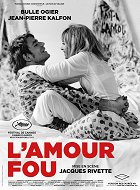Directed by:
Jacques RivetteComposer:
Jean-Claude EloyCast:
Bulle Ogier, Jean-Pierre Kalfon, Yves Beneyton, Dennis Berry, Étienne Becker, Michel Delahaye, Michèle Moretti, Celia, Françoise Godde, André S. Labarthe (more)Plots(1)
Sébastien (Jean-Pierre Kalfon) is staging an adaptation of Racine’s tragedy, Andromaque while a film crew captures their rehearsals on handheld 16mm. The production’s star and Sebastian’s wife, Claire (Bulle Ogier), cannot take the pressure and removes herself. Life imitates art, creating a tragedy for the couple when Sébastien recasts the role with his ex. L’amour fou is a hypnotic study of tempestuous love, told with director Jacques Rivette’s signature reflexivity and containing striking examinations of performance, art, theatre and life. (Radiance Films)
(more)Reviews (2)
Unlike other experimental films of the time, the film tackles both the techniques of film and theater but paradoxically does not directly address itself, meaning the current plot, but only the medium of film (or maybe just television? In any case, something to do with the camera...) and drama. The medium of film is approached in a slightly metafictional spirit of a television crew that introduces techniques of cinéma-vérité into the entire film, which on the one hand serves as a humorous counterpoint to the linguistically pompous Racine classicism, and on the other hand, complements the simplicity of the mise-en-scène of that theater within a theater. Above all, it raises the question of whether Rivette is using it as a counterpoint or as a complement to his attempt to capture the disintegration of mad love – should the viewer follow a faithful depiction of the plot (Ogier-Kalfon), or should something always escape them? Thus, should we even try to understand the psychology of the characters, especially Ogier, or should we consider psychology as definitively ungraspable because it is still in the process of being formed? And what is this stage if not a theater rehearsal? The thematization of drama in Rivette's works is an apotheosis of theater, even at the expense of film. A nice comparison is presented: Ogier=content, Kalfon=form. The same can be translated as drama=content, film=form. Not only are the relationships homologous to a theater rehearsal (where, for example, Ogier quotes and transforms the same Racine at home, etc.) and thus the driving force of the film, but also in this thematization, theater is the primary instance: the film comes to shoot the creation of the drama, and it only lives while the drama tries to live (that is, to move towards perfection through repetition, even if it should only be a horizon), or as long as Ogier and her madness try to achieve the impossible: love.
()
Rivette is actually not that riveting. I’m not someone who would complain about a long runtime or make one of those know-it-all statements about how X number of minutes should have been cut out of a film. But I see no justification for the tremendous length of Mad Love. The viewer sees all of the theses that Rivette intended to convey with the film (emotional drama set against the backdrop of classical drama, an artist talking about feelings that he is not capable of experiencing, the rehearsing of a play as a rehearsal of behavioural patterns, etc.) relatively early on and then suffers through their needlessly drawn-out execution. Unless the aim was to build distance between the viewer and the central protagonist, in which case every minute actually has meaning. On the other hand, the same purpose is served by the superb means of presenting it in the pretentious way of wearing glasses. Mad Love is precisely representative of the archetype of the stiff, self-regarding New Wave blathering that Jean Eustache so brilliantly subverted and disparaged in his almost equally long but bitingly funny and unaffectedly lively masterpiece The Mother and the Whore.
()


Ads